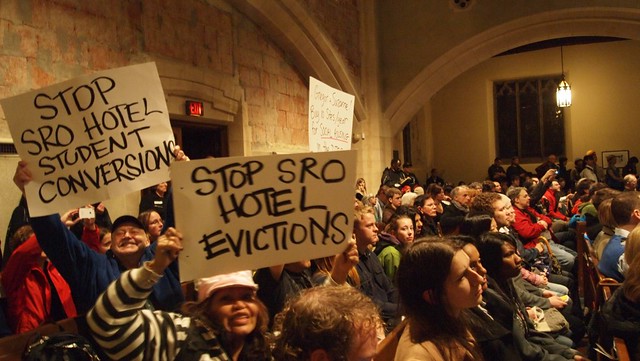UNCEDED COAST SALISH TERRITORY, VANCOUVER: On Tuesday April 10th more than 100 Downtown Eastside residents gathered for a rally in the theatre of the Carnegie centre to sound an alarm: Displacement, they said, is happening. And worse, if city council does not take immediate and serious action, it will quickly become a desperate crisis.
The rally was motivated by developer Marc Williams’ proposal to build 79 quarter-million-dollar condos on the 100-block of East Hastings Street, between the Regent and Brandiz hotels and across the street from North America’s only legal supervised injection site. The proposal is years in the making and was rejected by two separate city bodies last year but is back and scheduled to go to vote at the city’s Development Permit Board on Monday April 23. That board, made up of developers, business investors and other political appointees, will vote on the project based on its measure within existing building policies. The DTES Not for Developers Coalition has been organizing against the project for about a year, and Tuesday’s rally continued their call for City Hall to reject the project.
Sixteen community groups gathered with the DTES Not for Developers Coalition to speak in one voice from their diverse specific perspectives and demand that the city say no to “Sequel 138″ condos and to buy the site and dedicate it entirely to welfare and old age pension rate social housing.
The rally was opened with statements from people who live in SRO hotels on the 100-block of East Hastings, where the condo project is proposed. Washington Hotel residents are “illicit drinkers, drug users, and we struggle with our mental and physical health. We are the people who are not wanted by developers and condo owners.” Their statement was read by John Skulsh, who said, “We don’t have housing options, we have housing ultimatums: Live in this 10×10 room without the privacy of your own bathroom, and without the health, food, and hygiene choices of having your own kitchen, or go back to the street.”


